LGBTQ Non-Profit Organizations
Mayor Parker: LGBTQ elected leaders are ‘the strongest line of defense’
Outgoing Victory Fund president on her departure — and urgent need to defeat Trump
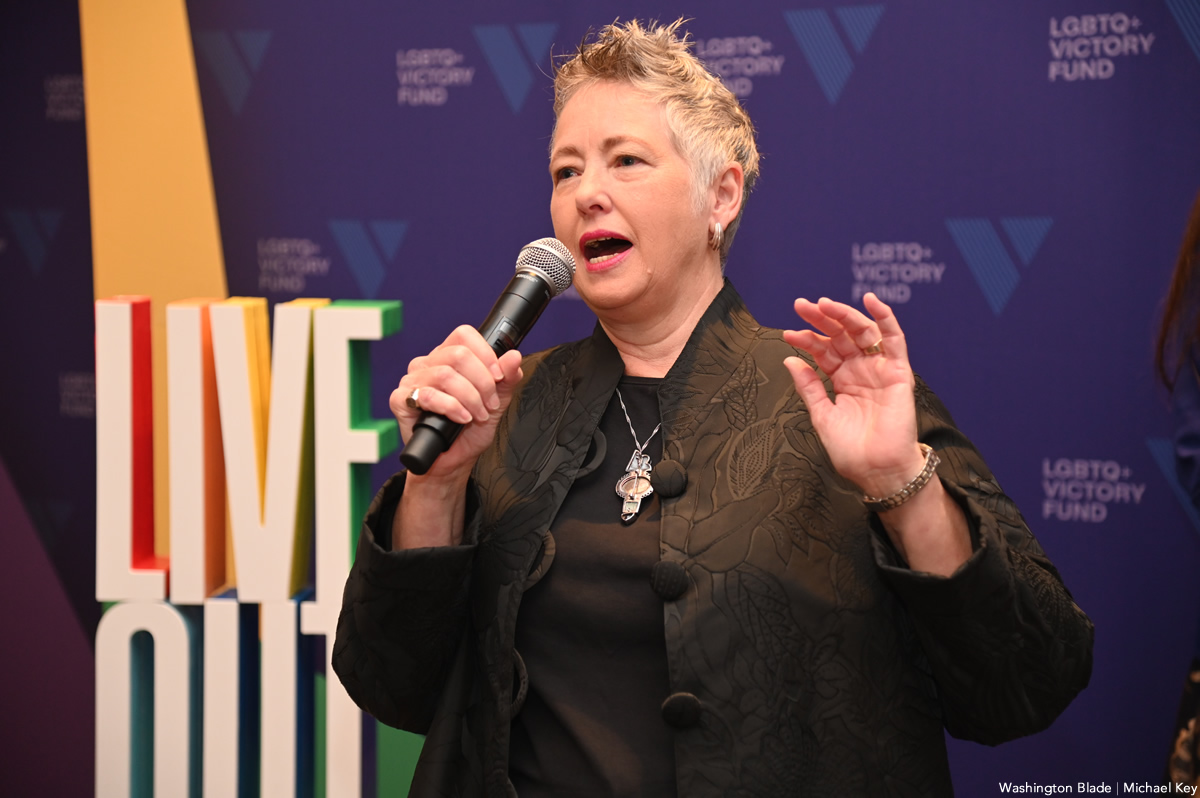
The Washington Blade connected with former Houston Mayor Annise Parker last week, shortly after breaking the news of her departure from the LGBTQ Victory Fund and LGBTQ Victory Institute after six years of serving as president and CEO.
The organizations are, respectively, dedicated to increasing the number of public officeholders who are LGBTQ and providing training and resources for them, whether they are appointed or elected to the positions they hold.
Parker’s exit was planned since last July, in coordination with the boards of directors. “We worked out the timing together,” she said. “I wanted 2024 to be my last year, but I also think we all recognize the importance of this election and what’s going on politically,” and for these reasons “I wanted to [leave] in the least disruptive way possible.”
This means staying on through the end of this year, in part to assist the boards in “a thoughtful search process” for her successor.
Parker told the Blade she agreed to take the helm at Victory at a time when the organization had strong foundations but “lost its way a little bit” by straying from its “really narrow mission,” which is “to put LGBT leaders into public office.”
“In my view, one of the most important things I did was bring us back to where we started,” she said. “We’re the only national organization that only works with LGBT leaders. We love our allies and we respect our allies, but they are not our mission.”
So far this year, conservative lawmakers have proposed more than 400 bills targeting the rights of LGBTQ Americans. The moral panic stoked by the right wing against queer and especially trans people brings into sharp relief the importance of the work in which Victory is engaged, Parker said.
“Because of these ever growing attacks on our community, the need for LGBT leaders who are willing to step up and serve and run for office has never been greater,” she said. When Victory was founded “33 years ago, there were just a handful of folks; most of our community was in the closet.”
Parker remembers, “I ran for the first time in 1991, the year Victory was founded. It was a long time ago. We were pioneers. But now we are the strongest line of defense. And the barbarians are at the gate.”
Then, as now, coming out “in all aspects of our lives” is “the most powerful thing we do,” Parker said — a lesson she first learned as an activist in the 1970s. “It still matters,” she said. Candidates backed by Victory are often voters’ first exposure to gay, lesbian, bisexual, trans, or genderqueer people, she noted — “and it changes hearts and minds.”
Many begin their careers in public service at school boards or other local offices, but go on to serve in progressively higher-profile roles, Parker said. She pointed to Colorado Gov. Jared Polis, who is gay, and served as a statewide education official before his election to the U.S. Congress and then the governorship.
The importance of local races must not be overlooked, Parker stressed. To take the example of school boards, she said, “folks on the other side” like the anti-LGBTQ extremist group Moms for Liberty are “targeting school boards for the same reasons that Victory works in school boards.” So, “we need to be where our enemies are.”
Opponents of LGBTQ rights “see what’s happening demographically, in terms of changing attitudes, about all sorts of things — including the LGBT community,” and while “we have won this war,” generationally speaking with increased acceptance, Parker warned that “we can still lose a whole lot of battles.”
“These overt attacks, you know, they didn’t have to attack us 30 years ago in the same way, because we had no protections,” Parker said. “This is part of the backlash for all of the successes that we’ve had.”
An example of that success: “There is no place in America,” she said, “that is not accessible to the right LGBT candidates with the right mix of ideas and energy and insights for that district to win.”
Parker added, “And part of the reason that we push so hard for our trans candidates that we work with, is that they’re the tip of the spear right now. They’re the ones that are the target of the attacks.”
At the same time, she is clear-eyed about the threat presented by the presumptive Republican nominee for president.
“What keeps me awake is the idea that Donald Trump could again become the president of the United States,” Parker said. “That is horrifying. And I would I would willingly lose every other race to keep him away from — I mean, I just perceive him as an existential threat to democracy in America.”
Here, again, part of the bulwark against this threat will be “our candidates,” who are “mobilizing people who will be in direct opposition to the horrific vision of America that he’s pushing,” Parker said. “I absolutely believe there’s a fundamental difference between the two presidential candidates that we’re going to have. And I also believe that it’s critical for democracy not to have Donald Trump.”
The fight for bodily autonomy
The Victory Fund endorses LGBTQ candidates who are positioned to win and who also believe in bodily autonomy; the right to privacy that undergirds not only protections for LGBTQ people but also reproductive freedoms.
“When we were founded,” Parker said, the attacks on body autonomy were happening on multiple fronts, from restrictions on access to abortion to sodomy statutes that criminalized gay sex acts between consenting adults.
“All these trans issues we’re facing right now are about bodily autonomy,” she said. “We can have a legitimate argument about gender affirming care for people under 18 or even under 21, but for adults, it is about body autonomy.”
Likewise, under the right to privacy rubric, “more and more places are rethinking how we deal with those who abuse substances,” she said, adding that anyone who is LGBT has to care about a right to privacy that incorporates body autonomy.
Parker explained that “Over the years, there have been a lot of men that I’ve talked to who asked the same question, ‘Well, why do you have to be pro choice?’ Our candidates don’t have to believe in or want to support abortion, but they must believe that every human being has the right to body autonomy, because they demand it for themselves.”
As a result, and because of the Republican Party’s hostility toward reproductive freedom and the rights of trans people, Parker said “it is really challenging to find Republican candidates” who qualify under the criteria for Victory Fund as an endorsing PAC.
Most conservative candidates who object to the criteria about abortion “also have problems with the fact that we are fully supportive of the trans community,” she said.
Feeding the pipeline
Asked about plans for Victory following her departure, Parker said there are concrete goals and metrics that were established in the organizations’ five-year strategic plan, among them, building a roster of “LGBT candidates who are ready for the presidential stage.”
The Victory Fund endorsed former South Bend, Ind., mayor and current U.S. Secretary of Transportation Pete Buttigieg’s presidential run in 2020 — but even though he was the only LGBTQ candidate, the endorsement was hardly a foregone conclusion.
“I am a huge Pete Buttigieg fan,” Parker said. “I think he’s got mad political skills,” but at the same time, she hedged, “when you think of presidential candidates, you think of governors” or folks who are well known on the national stage, often with many years of service in public office.
“From the first notice to his first announcement, we waited six months because — and I had the conversation with him — you have to poll consistently; you have to be competitive financially; and show you can place in these primaries,” Parker said. “And he did.”
The Transportation Secretary has “superb political instincts,” she said. “He is brilliant. He has the ability to connect to people. And he thinks really strategically.” Parker added that she expects to be able to vote for him again.
Also in Victory’s roster of potential presidential candidates are “three governors and a former governor, Kate Brown” along with “other statewide elected officials — so we have two attorneys general, two United States senators,” and “big city mayors; I’m a former big city mayor,” and then “you have [San Diego Mayor] Todd Gloria and [former Chicago Mayor] Lori Lightfoot.”
LGBTQ Non-Profit Organizations
Victory Institute honors President Biden
Former president celebrated for LGBTQ rights record
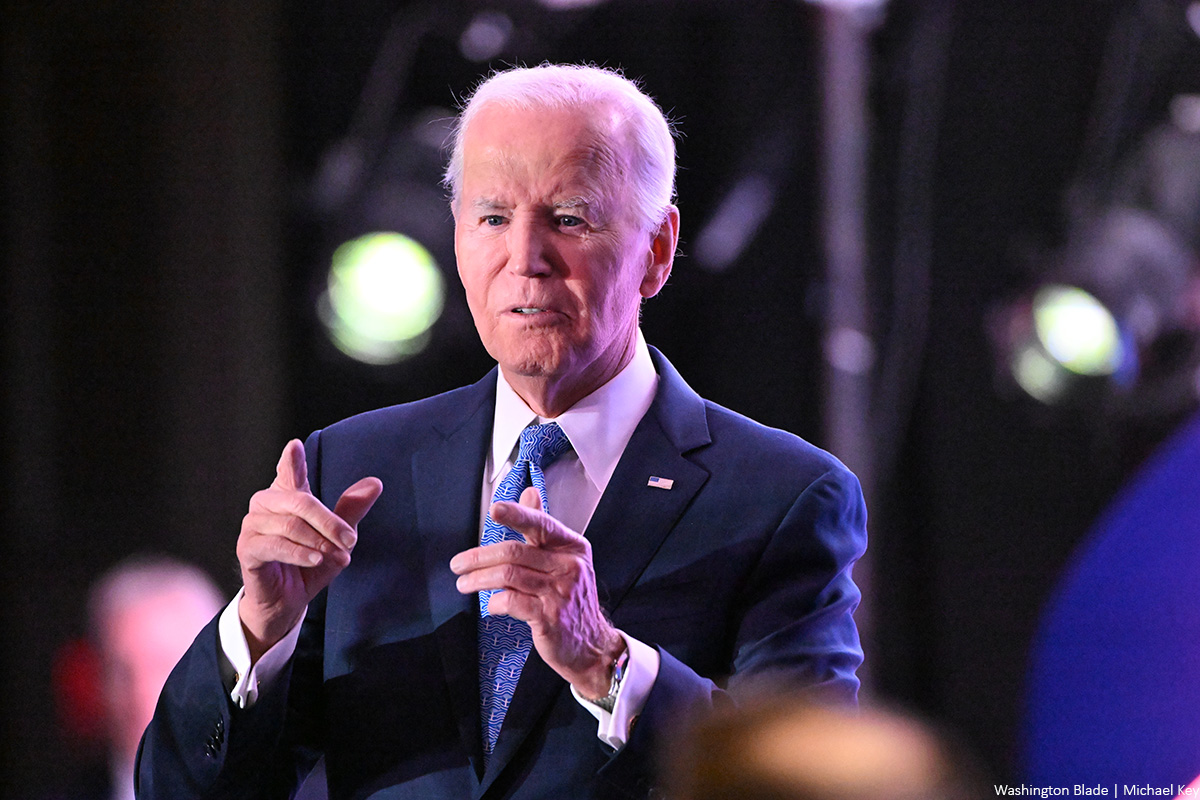
Former President Joe Biden received the Chris Abele Impact Award on Friday at the JW Marriott in downtown Washington, honored by the LGBTQ+ Victory Institute for his decades-long commitment to advancing LGBTQ rights, workers, and policies.
The ceremony was held during the Victory Institute’s 41st annual International LGBTQ+ Leaders Conference, which brought together LGBTQ elected and appointed officials, staff, media, and supporters from across the world.
Biden — often described as the most pro-equality president in American history — used the moment to trace his own evolution on LGBTQ equality, acknowledging both early missteps and later milestones. As a young senator, he said, his understanding was limited. He voted for the Defense of Marriage Act in 1996, which federally defined marriage as between a man and a woman, and once publicly echoed beliefs he now rejects.
“My gut reaction is that they [homosexuals] are security risks,” Biden said in 1973, according to the Morning News, a Delaware newspaper. “But I must admit I haven’t given this much thought.”
After serving 36 years in the U.S. Senate and becoming Delaware’s longest-serving senator, Biden joined Barack Obama’s presidential ticket. It was during those years, he said, that he began reevaluating LGBTQ issues more deeply — culminating in a defining moment that altered the national conversation.
In 2012, Biden stunned the political world when he endorsed same-sex marriage during an appearance on Meet the Press, publicly staking out a position ahead of Obama.
“Back in 2012 I went on Meet the Press and got myself in a bit of trouble, but good trouble,” Biden joked. “I told the truth. I expressed my support for gay marriage.” His comments are now widely seen as a watershed moment in the national movement toward marriage equality.
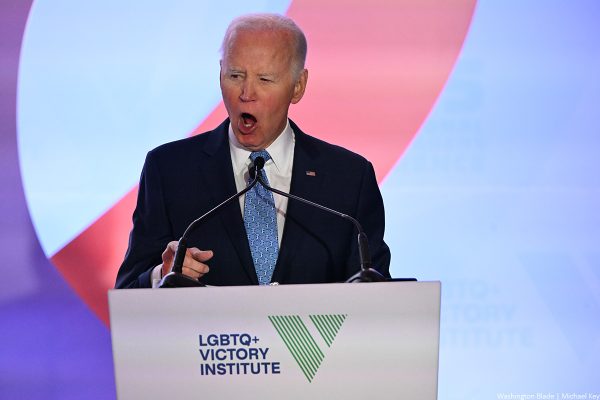
That shift, Biden said, emerged from countless small interactions with LGBTQ Americans — many of them deeply personal. He described one in particular that stayed with him.
“I was speaking a few weeks earlier to a group of LGBTQ leaders in a private home,” he said. “During the Q and A period a gentleman stood up and said, ‘Mr. Vice President … How do you feel about us?’ I turned to the gay couple who owned the house. I looked at both of them. I said, ‘What did I do first, when I walked in the door to your home?’ They both said, ‘You walked right up to our two children.’”
It was in that moment, he said, that he understood at a visceral level what equality meant. “I wish every American could have seen the loving eyes of these two young boys for their dads. If they did see that, they’d never have any doubt what this is all about.”
With marriage equality legalized nationwide in 2015, Biden continued to speak forcefully for LGBTQ rights — even amid criticism from conservatives. That commitment only deepened, he said, as he encountered more LGBTQ people and gained a better understanding of their lives.
When he entered the White House in 2020, Biden said his goal was clear: build an administration that reflected the nation it served.
“When I took office, I promised to have an administration that looked like America … You all worked on issues that went far beyond equality for the LGBTQ community,” he said. “With your help, we accomplished much — not just for this community, but across the board to create opportunity for everybody.”
He highlighted the Respect for Marriage Act — signed in December 2022 — as one of the most meaningful achievements of his presidency.
“Next week marks three years since many of us stood on a crisp day on the South Lawn of the White House where I signed Respect for Marriage,” he said. “The moment had an air of celebration, but also, quite frankly, for me and many of you, an air of relief … the momentous battle was finally won. Finally, finally, finally.”
But Biden warned that much of this progress is now under threat under the Trump-Vance administration, which he accused of targeting LGBTQ communities by slashing funding for organizations, healthcare, and HIV/AIDS programs.
“Today, though, we know much more work to do, and the challenges ahead can feel daunting, particularly in the face of everything we’re seeing coming out of this reactionary White House.”
He placed responsibility squarely on President Donald Trump and Republican leaders.
“Donald Trump and many Republicans distort and derail our fight for equality,” he said. “They’re trying to turn it into something scary, something sinister. But at its core, it’s about making every American be treated with basic decency, dignity, and respect.”
“This administration is trying to use those issues as a wedge to further divide the country,” he continued. “But there’s nothing more American than the notion of equality. Nothing, nothing, nothing.”
Biden said the consequences of such attacks are especially harmful to LGBTQ youth. “Right now, no small number of young people are sitting alone at home, scrolling through social media, staring at the ceiling, wondering whether they’ll ever be loved … My message to young people is this: just be you. You are loved. You belong.”
He connected LGBTQ equality to a broader national ideal, one that has pushed America forward.
“We are an idea stronger and more powerful than any dictator or army — that in America, we hold these truths to be self-evident, that all are created equal and all deserve to be treated with dignity. We’ve never lived up to that idea, but we’ve never walked away from it.”
Biden’s record — through both the Obama and Biden administrations — on LGBTQ issues is extensive. He played a key role in the repeal of “Don’t Ask, Don’t Tell,” allowing gay and lesbian service members to serve openly. As president, he signed sweeping executive orders banning discrimination based on gender identity or sexual orientation across federal agencies, healthcare, housing, and education. He reversed the ban on transgender military service and, in 2024, issued categorical pardons for service members previously convicted under the military’s historic ban on consensual gay sex.
He oversaw passage of the Respect for Marriage Act, appointed a historic number of LGBTQ federal officials — including Pete Buttigieg and Dr. Rachel Levine — and pushed for expanded nondiscrimination protections in healthcare and education. Abroad, he directed U.S. agencies to prioritize LGBTQ rights in foreign policy. He also hosted the largest Pride celebration in White House history and became the first president to issue a proclamation for Transgender Day of Visibility. And he continues to urge Congress to pass the Equality Act.
In “Promise Me, Dad,” his memoir published shortly after his son Beau’s death, Biden reflected on his own evolution and the country’s. It took time, he wrote, for many Americans to understand “the simple and obvious truth” about gay men and women: that they are “overwhelmingly good, decent, honorable people who want and deserve the same rights as anyone else.”
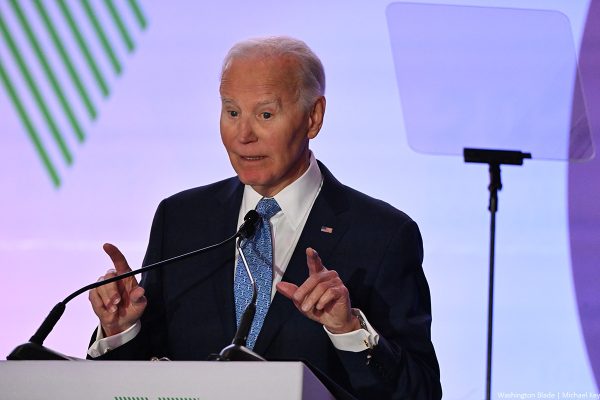
He closed his remarks Friday with a call to persist despite political headwinds.
“Friends, we are one of the only countries in the world that time and again has come out of every crisis stronger than we entered it. I still believe we can emerge from the many crises caused by this administration stronger, wiser, and more resilient than before. We just have to get up … and remember who we are.”
LGBTQ Non-Profit Organizations
Marsha P. Johnson Institute announces new executive director
Chastity Bowick to succeed Elle Moxley
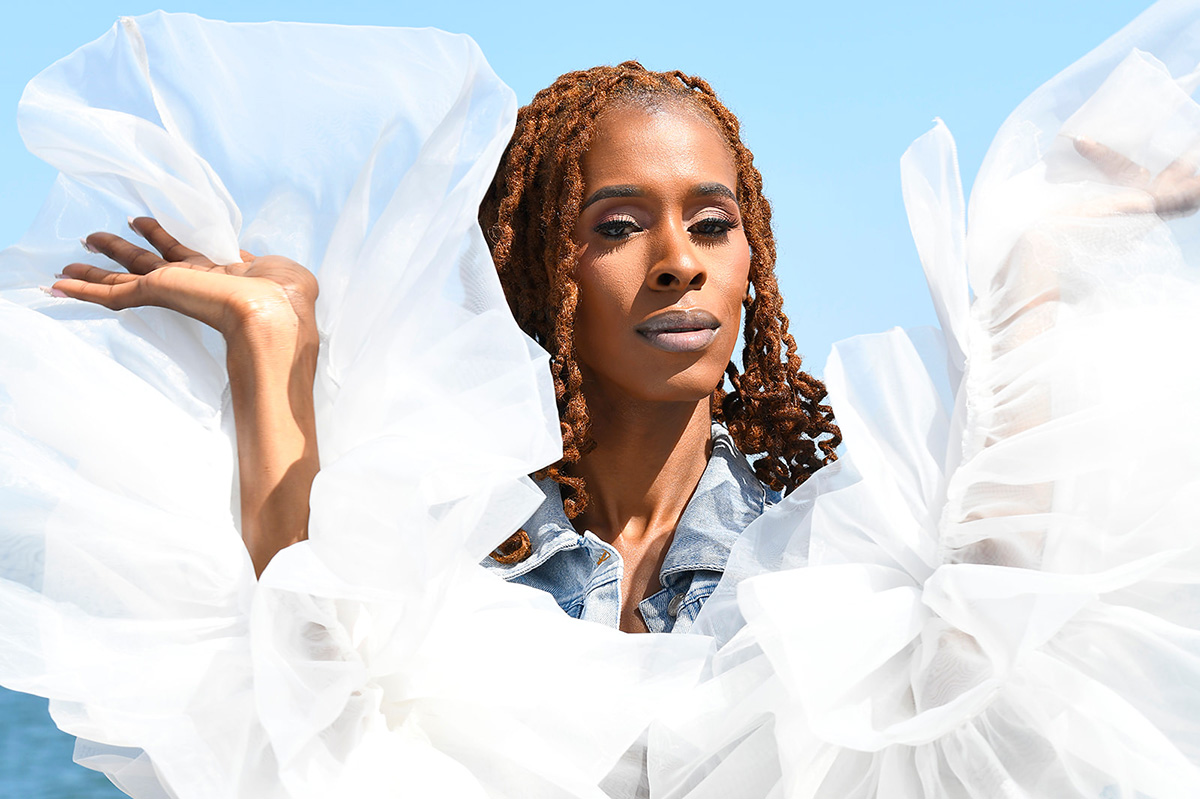
Chastity Bowick is the new incoming executive director of the Marsha P. Johnson Institute.
Current executive director Elle Moxley is stepping down after six years.. She founded the organization in 2019 as a national nonprofit dedicated to the protection of Black transgender people.
“Marsha lit the path, and Elle carried that fire by building an institute rooted in truth, survival, and joy. I step into this role not to replace that legacy, but to carry it forward as part of one continuous story,” Bowick said.
Bowick is a trans activist, consultant, and model. She is the former executive director of the Transgender Emergency Fund of Massachusetts, a crisis agency for the state’s trans community.
The AIDS Action Committee of Massachusetts awarded Bowick the 2016 Belynda Dunn Award for Bowick’s leadership in providing transgender health programming at AIDS Project Worcester. She also served on the board of the Massachusetts Transgender Political Coalition for four years.
Bowick is currently the CEO of Chastity Bowick Consulting and Talent Group, which provides services and programs meant to empower trans women of color to advocate for and with the trans community.
Moxley told the Washington Blade in 2022 that her decision to launch the Marsha P. Johnson Institute “was in response to the consistent murders that were being reported of Black trans women across the country.”
Based in Columbus, Ohio, the group offers advocacy and artistic fellowships alongside state-specific resources, including a trans bill of rights toolkit.
“The Marsha P. Johnson Institute was never mine alone; it has always belonged to the community. Marsha inspired this institute through her unapologetic fight for freedom and her human rights, and I carried that legacy forward by building an organization rooted in those same values,” Moxley said.
Bowick stated she aims to both uphold Marsha P. Johnson’s legacy and Moxley’s foundational work “as part of one continuous story.”
“To the extremists and lawmakers who legislate against our humanity: we are still here, our voices will not be silenced, and we are not going anywhere. Together, we will honor the foundation and build higher,” Bowick said.
The Marsha P. Johnson Institute is partnered with a variety of companies and other groups that share similar values, ranging from H&M to Planned Parenthood, according to the organization’s website. Singer Lizzo also previously donated $50,000.
Learn more about the Marsha P. Johnson Institute at its website.
LGBTQ Non-Profit Organizations
HRC’s 2025 National Dinner champions LGBTQ equality amid right-wing attacks

The Human Rights Campaign held its annual National Dinner on Saturday, a cornerstone event aimed at raising both funds and awareness for the ongoing fight for LGBTQ equality in the United States. For the first time in more than two decades, the gala was hosted at the Washington Hilton, moving from its traditional home at the Walter E. Washington Convention Center. The change in venue marked not only a physical shift but a reflection of evolving priorities, including enhanced security and a more intimate guest list, according to attendees who have been coming to the gala for years.
Despite these changes, the event was sold out, with approximately 2,500 supporters filling the International Ballroom. Ticket prices ranged from $450 for general admission to $1,250 for premium seats, with full tables of 12 reaching $15,000. The gala remains HRC’s single largest annual fundraiser, drawing some of the most prominent voices and allies in the LGBTQ community.
The evening’s atmosphere was a study in contrasts. Smiles and fashionable ensembles could be seen at every turn, yet there was an undercurrent of somber reflection as conversations throughout the night frequently turned to the ongoing fight for equality, particularly in light of attempts to roll back protections like Obergefell v. Hodges and the Trump administration’s crusade to ban gender-affirming healthcare. Notably absent from discussions was the recent shooting of Charlie Kirk, despite HRC’s public pressure on the Wall Street Journal to retract its erroneous reporting linking the suspect to the transgender community.
The evening’s program, which lasted more than four hours, was led by HRC President Kelley Robinson, who has guided the organization since late 2022. Robinson, a former executive director of Planned Parenthood, delivered a stirring address that balanced acknowledgment of progress with the stark reality of continuing challenges.
“It can be really hard to dream when we are living in a nightmare,” Robinson said. “These are not ordinary times. There is nothing ordinary about ripping parents from their children, cutting billions from programs that keep people alive, or trying to erase our marriages. Love is still love.”
She continued, emphasizing the intrinsic role of LGBTQ advocacy in American history.
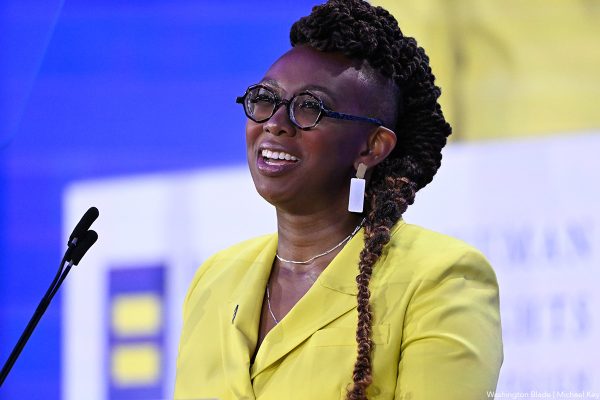
“This is our country. We have paid for it in marches and vigils, in court cases and funerals, in freedom songs and in blood. This is our inheritance,” she said. “This is our damn country too… Every seed we plant turns backlash into breakthrough. Every act of courage can turn despair into determination. Every dollar we raise brings us one step closer to equality. One day soon, we will be more familiar with joy than we are with grief. One day soon, we will feel as safe under the American flag as we do under the Pride flag… We’ve got to choose hope anyway. We’ve got to choose love anyway. We’ve got to choose joy anyway.”
Maryland Gov. Wes Moore, who was also in attendance, delivered a rousing speech that acknowledged the ongoing marginalization of LGBTQ people, particularly transgender individuals, while celebrating the progress Maryland has made in protecting its citizens.
“Silence will never be forgotten. I am drawn to those who are unafraid, and in President Robinson, HRC has exactly that kind of leader,” Moore said.
He went on to critique policies that continue to harm LGBTQ Americans—without directly naming the Trump administration—and underscored Maryland’s steadfast protections for its LGBTQ population.
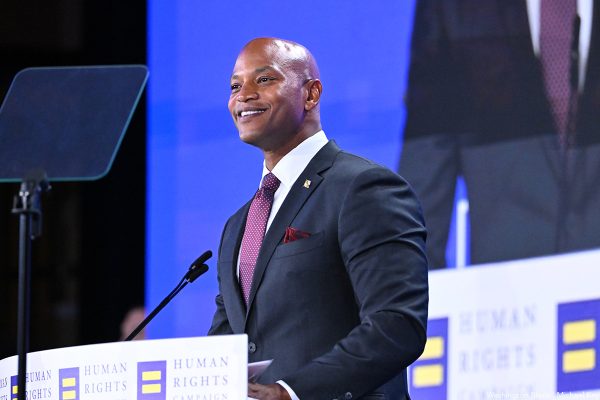
“Nobody should ever have to walk around and feel like they have to justify their humanity in Maryland—or anywhere in the United States,” he said. “We don’t get to pick the times we live in—those times pick us. The only question is, when the moment comes, do we run or do we lead? HRC was built in a moment like this—not when it was easy, but when it was hard. And that is why HRC is built to lead right now… Those who seek to destroy will fade away and be forgotten. But those who stand up for equality and justice will be everlasting.”
Congresswoman Sarah McBride (D-Del.), the first transgender person elected to Congress and a former HRC staff member, delivered the evening’s keynote. Her speech focused on the urgent need to defend transgender rights in the face of escalating attacks on gender-affirming healthcare for youth.
“It is balm for the soul to be with family tonight—with my parents, my brother and his husband, and my HRC family,” McBride said. “Two LGBTQ kids were a blessing in our home, and I stand before you as both an out transgender woman and a member of the United States House of Representatives.”
McBride highlighted the consequences of bans on gender-affirming care, citing a recent report from The Williams Institute showing that 40.1% of trans youth aged 13-17, roughly 120,400 individuals across 27 states, are affected.
“As a trans person, I am scared. I know millions like me are scared about where this could end for all of us,” she said.
Despite those fears, McBride emphasized dialogue and coalition-building as essential strategies for change.
“The lesson from both our progress and our current challenge is that when the public is with us, nothing is impossible—but without it, nothing is sustainable. We rejected the short-term comfort of preaching to our own choir and instead found the courage to grow our congregation. We welcomed imperfect allies and created room for people to grow—with space and grace.”
She concluded by urging attendees to channel their energy into positive action, including supporting organizations like HRC.
“The answer to that hate is not more hate. That love invites people in. That joy grows our ranks, and hope—infectious and inviting hope—is the only way forward.”
Artist Amy Sherald, celebrated for her evocative depictions of LGBTQ Americans, was honored with the “Ally for Equality” award. Sherald’s work, including her controversial painting “Trans Forming Liberty,” which reimagines the Statue of Liberty as a transgender woman, recently faced censorship at the Smithsonian, highlighting the ongoing challenges artists encounter when addressing LGBTQ visibility. The painting is instead being exhibited at the Baltimore Museum of Art.
“If there’s irony in a painting called Transforming Liberty being censored in America, it’s that the ideas behind it—visibility, dignity, and freedom—are louder than any wall it can hang on or be taken down from,” Sherald said. “That painting was a love letter to my trans friends and the trans community—but when it was censored, it felt like someone had tried to paint over me too. The thing about art and truth is, you can try to cover it up, but it never disappears.”
Sherald, who is straight, is known for her greyscale portraiture, which avoids traditional black-and-white representations of skin tone, instead capturing a spectrum of human experience. Her work often reinterprets classic American iconography—like “V-J Day in Times Square” or the Statue of Liberty—to reflect a diverse, queer, and inclusive vision of the nation.
“This room is the living portrait of liberty and progress,” Sherald said. “You are what freedom looks like when it transforms.”
Music also played a central role in the evening. Former American Idol contestant David Archuleta performed alongside the 10-member Gay Men’s Chorus of Washington, D.C., delivering his original song “Home” before shifting into a spirited rendition of George Michael’s “Freedom.” Archuleta, who spoke candidly about stepping away from the Mormon Church despite his family’s deep ties, captivated attendees in a greyscale cutout suit without a shirt beneath, while many guests danced in the ballroom.
Non-binary singer Vincint closed the evening with two performances, including the popular “Take Me Home,” leaving the crowd energized and inspired.
The gala also featured an ambitious auction and raffle, with prizes ranging from a three-day trip to Cocoa Beach and tickets to the Macy’s Thanksgiving Day Parade, to a luxury Tahiti cruise for two. A brand-new 2025 Lexus RZ was among the coveted auction items. HRC highlighted the “Worth It” initiative during the evening, aimed at helping LGBTQ individuals reach key financial goals, reinforcing the organization’s broader mission to empower the community beyond advocacy and visibility.
Throughout the dinner, videos celebrating HRC’s history underscored the enduring struggle for equality. From its founding in 1980 to its fight against the AIDS epidemic and its advocacy for marriage equality, the organization now claims a membership of 3.6 million. Clips also highlighted HRC’s recent “American Dream” initiative, designed to bridge societal gaps and ensure all Americans, including LGBTQ individuals, can access opportunities traditionally denied to marginalized communities.
Andry Romero, a gay man who was deported, was recognized as part of HRC’s continuing call to protect LGBTQ lives. Board members honored corporate sponsors and past members of the board who had passed away, highlighting the importance of inclusive workplaces and equitable treatment for LGBTQ employees.
Comedian Dana Goldberg offered a moment of levity while maintaining the night’s central theme of resilience.
“You will never erase this community. We are here to stay…we have to keep our joy. They can’t take that from us,” Goldberg said. She also reminded guests that small acts, like donating through the Lyft app’s “round-up” feature, have collectively raised millions for HRC initiatives.
As the evening drew to a close, it was clear that while the challenges facing the LGBTQ community are significant, the spirit of resistance, hope, and solidarity remain strong. The 2025 HRC National Dinner celebrated not just the progress that has been achieved, but also the courage, creativity, and resolve required to continue fighting for equality.
-

 Sponsored5 days ago
Sponsored5 days agoSafer Ways to Pay for Online Performances and Queer Events
-

 District of Columbia4 days ago
District of Columbia4 days agoTwo pioneering gay journalists to speak at Thursday event
-

 Colombia3 days ago
Colombia3 days agoBlade travels to Colombia after U.S. forces seize Maduro in Venezuela
-

 a&e features4 days ago
a&e features4 days agoQueer highlights of the 2026 Critics Choice Awards: Aunt Gladys, that ‘Heated Rivalry’ shoutout and more

















